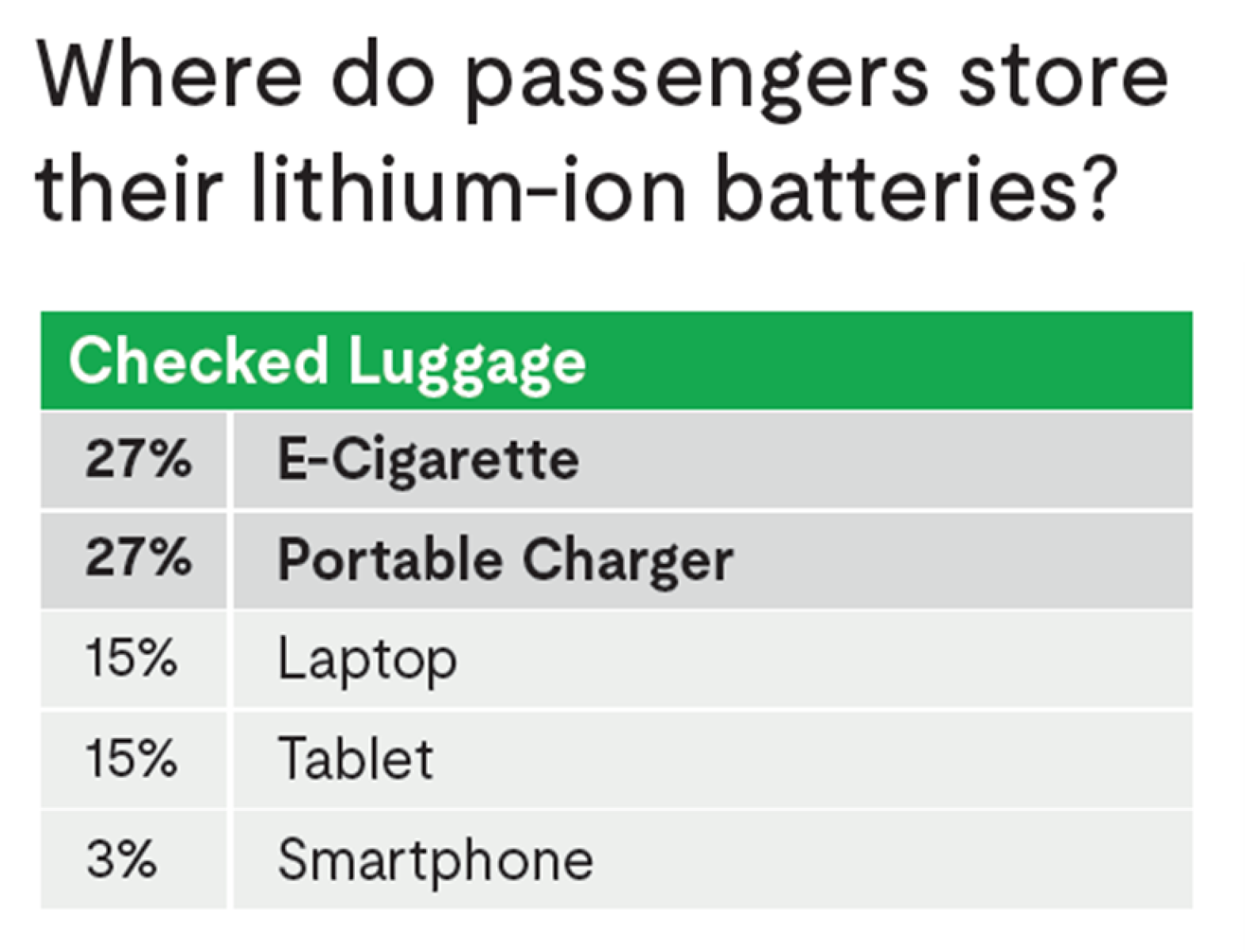Passengers’ lack of awareness resulting in increased risk — and incidents — on board
Washington, D.C. – Today, UL Standards & Engagement released a report highlighting survey results that show a major awareness gap among U.S. adults regarding lithium-ion batteries and the devices they power, which can contribute to greater thermal runaway risks when traveling by plane.
“We found that Americans have little awareness about which electronics and technology products contain lithium-ion batteries, including those they bring with them on an aircraft,” said Sayon Deb, director of primary insights at UL Standards & Engagement. “If airline passengers don’t know which devices are powered by lithium-ion batteries, then we have to assume they’re misunderstanding warnings and questions about what’s in their luggage.”
Air travel increased 37% from 2022 to 2023, leading to more passengers and more of the lithium-ion battery-powered devices they bring with them. These batteries, while efficient and widely used, can go into thermal runaway if damaged, improperly charged, poorly manufactured, or counterfeit. Thermal runaway is a state of uncontrollable self-heating that can cause lithium-ion batteries to catch fire or even explode.
“Thermal runaway events in aviation are rare and largely avoidable if passengers understand the best practices of carrying lithium-ion battery-powered devices with them,” said David Wroth, director of technology and systems at UL Standards & Engagement and the lead on the organization’s Thermal Runaway Incident Program. “What this report shows, however, is those best practices are not known or followed, and the risk that presents is far more complicated at 40,000 feet.”
报告的主要结论包括
- Thermal runaway incidents are on the rise. Incidents are at their highest point in the five years in TRIP’s data history, averaging more than two incidents per week. Nearly all airline travelers (96%) typically bring at least one rechargeable electronic or technology product that is powered by a lithium-ion battery with them onboard. Yet 44% of Americans admitted to knowing nothing about these batteries.
- Travelers are missing the message. Airlines and airports are actively warning passengers about lithium-ion batteries, but more than three-quarters (76%) report that they do not recall seeing lithium-ion battery-related messages during online check-in. Further, more than half of travelers either cannot recall seeing or hearing (38%) or do not know if they saw or heard (14%) safety signage announcements regarding lithium-ion batteries at any point of their travels.
- Despite warnings, many of these products are being stored out of reach. Keeping lithium-ion battery-powered products in arm’s reach can reduce the risk of thermal runaway, as only 12% of 2023’s reported incidents happened while the device was in use. These products should never be stored in checked luggage, yet 27% of passengers traveling with e-cigarettes — the most common culprit of thermal runaway incidents on planes — packed them in checked luggage. Another 27% placed portable power banks in their checked luggage.

“A device out of reach is a safety risk,” added Wroth. “We are actively working with the aviation community on how to curb the roughly two incidents per week we are tracking in our database.”
Airlines and airports are taking steps to mitigate the risks, including having battery fire containment products on board and warning passengers at check-in not to place lithium-ion battery-powered devices in their checked luggage. Further, 24 passenger and cargo carriers, including the largest in the industry, participate in UL Standards & Engagement’s Thermal Runaway Incident Program, voluntarily reporting incidents to the TRIP database and participating in program summits to solve for risk.
The report comes as UL Standards & Engagement hosts its TRIP Summit in London, the program’s first international convening, bringing together leaders in the aviation industry to work toward solutions to address this growing risk.
One of those solutions includes better options to suppress and contain thermal runaway incidents in the cabin. To that end, UL Standards & Engagement developed a standard for airplane containment solutions — UL 5800, Battery Fire Containment Products — that supports safer handling of thermal runaway incidents on board. The standard provides testing and performance criteria for various types of single-use fire containment solutions available to airline crew for use in the passenger cabin.
阅读报告全文 这里.
###
Methodology:
The results are taken from four ULSE Insights surveys, each consisting of responses from 2,000+ U.S. adults conducted August 28-30, 2023, September 25-29, 2023, October 23-27, 2023, and December 8-13, 2023. All studies were designed and formulated by UL Standards & Engagement. Surveys were administered online by BV Insights. As a member of the Insights Association and ESOMAR (the European Society for Opinion and Marketing Research), BV Insights adheres to industry ethics and best practices, including maintaining the anonymity of respondents.
The margin of sampling error at 95% confidence for aggregate results is +/- 2.2%. Sampling error is larger for subgroups of the data. As with any survey, sampling error is only one source of possible error. While non- sampling error cannot be accurately calculated, precautionary steps were taken in all phases of the survey design and the collection and processing of the data to minimize its influence.
注:除非另有说明,否则所有数字均为百分比。由于四舍五入,数字总数可能不等于 100%。
Additional data was collected from UL Standards & Engagement’s TRIP database, a voluntary reporting tool for passenger and cargo airlines and ground crew to report thermal runaway incidents. The data used in the report is from the 2023 reporting year.
关于 ULSE
UL 标准与参与是一家非营利组织,通过标准制定、合作和宣传,将安全科学转化为行动。自 1903 年以来,我们已为从防火门到自动驾驶汽车等各种产品制定了近 1700 项标准和指导文件。ULSE 通过召集专家、为政策制定者和监管者提供信息,促进创新,增强信任,为实现更安全、更可靠、更可持续的未来而努力。更多信息,请访问 ulse.org。
联系方式
凯蒂-塔伦蒂
UL 标准与参与
Manager, Media Relations & Strategic Positioning
P: (607) 742-8766
catie.talenti@ul.org